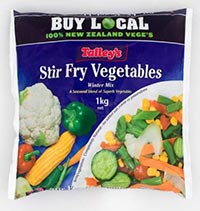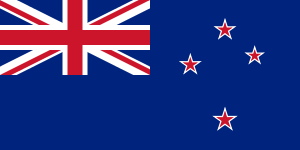Talley’s is the only frozen vegetable processor and distributor in New Zealand to source 100% of its ingredients domestically, according to a survey recently conducted by Consumer NZ. It also learned that out of 81 retail packs of frozen vegetables and fruits scrutinized, 17 had “vague statements” on labels that made it impossible for consumers to determine from where the contents were sourced.
Urging shoppers to know the difference between “Made in New Zealand” and “Product of New Zealand” designations, the consumer affairs organization points out that only the description of “Product of New Zealand” means that the produce was grown domestically. It thinks the time has come for the government to reconsider its position on country of origin labeling for frozen vegetables, as the matter has not been officially revisited in a decade.
Last year New Zealand imported $38 million worth of frozen fruits and vegetables ranging from strawberries and raspberries from Peru and Chile, respectively, to broccoli from China, sprouts from Holland and mashed potatoes from Belgium. The major supplying countries in terms of value, according to Statistics NZ, are: China, $14.3 million; Chile, $7.2 million; USA, $4.5 million; Vietnam, $1.4 million; and Thailand, $1.2 million.
 As Talley’s sells only home-grown produce, it stands out from other distributors that rely on imports to some extent. Among them are Wattie’s (which sources less than 20% of its vegetables from abroad), McCain, Sujon, Signature Range, Pams, Homebrand, Select and Budget.
As Talley’s sells only home-grown produce, it stands out from other distributors that rely on imports to some extent. Among them are Wattie’s (which sources less than 20% of its vegetables from abroad), McCain, Sujon, Signature Range, Pams, Homebrand, Select and Budget.
“We’ve only ever run out of spinach so we didn’t sell that product for a while. And to get around availability issues we vary what’s in our frozen vegetable mix depending on what’s in season,” Bob Darragh, national sales manager at Talley’s, told Consumer NZ.
According to Nelson-based Sujon, approximately 28% of its berries are purchased from companies in Canada and South America that have had long and close relationship with regional farmers.
 “Consumer-driven demand for seasonal berries all year ’round means our New Zealand producers just can’t keep up, but we are encouraging them to plant more crops,” said Michelle Manson, Sujon’s sales and marketing manager.
“Consumer-driven demand for seasonal berries all year ’round means our New Zealand producers just can’t keep up, but we are encouraging them to plant more crops,” said Michelle Manson, Sujon’s sales and marketing manager.
Concern over foreign sources of fruit supply in particular were heightened following an outbreak of Hepatitis A viral infections in neighboring Australia during February of this year. Illnesses reported in Queensland, Victoria and New South Wales – all believed to be connected to consumption of frozen berries sourced from China – led to a call for review of the nation’s system for inspecting imported food products.
Meanwhile, the New Zealand Ministry for Primary Industries maintains that knowing the country of origin does not provide food safety guarantees for consumers. Rather, it says, food safety is enhanced by pre-clearance arrangements and other measures established by exporting and importing countries.
In New Zealand, where country of origin labeling for food and beverages is compulsory only for wine, the law specifies that claims about a product’s source may not mislead or deceive consumers.





